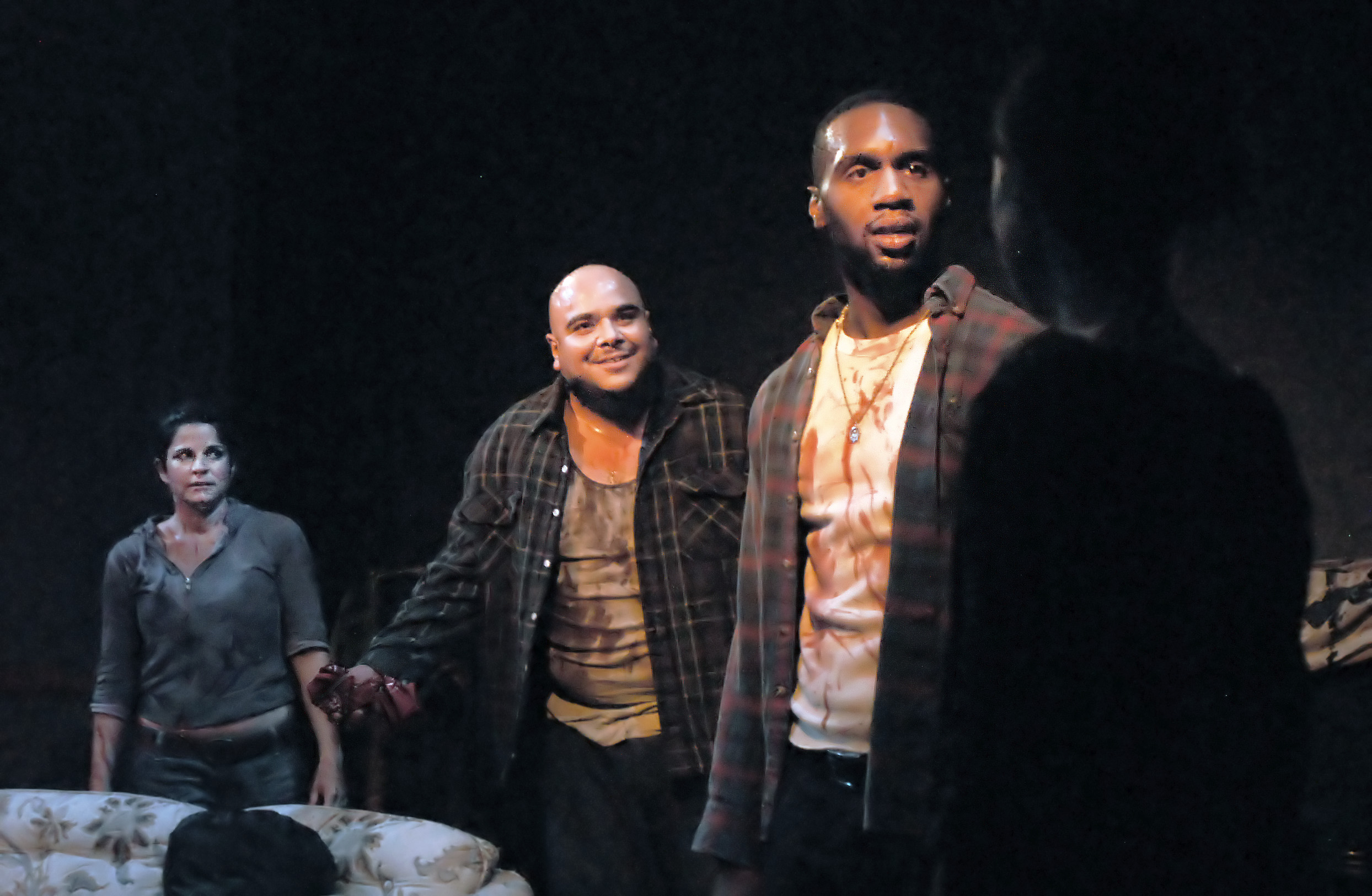“˜Massacre (Sing To Your Children)’ investigates the sources and limits of conflict in the modern world through an allegorical rebellion

From left, Lynn Freedman as “Janis,” Jose Zazueta as “Erik” and Toussaint Jeanlouis as “Panama” in a scene from “Massacre (Sing To Your Children).”
Massacre (Sing to your Children)
Weekends through May 1, Fridays and
Saturdays 8 p.m., Sundays 7 p.m.
The Underground Theater
1314 N. Wilton Place, $18
By Mette-Marie Kongsved
April 17, 2011 11:25 p.m.
Disembodied voices scream from the pitch-black stage, accompanied by loud sounds of struggling and fighting. A massacre is taking place.
This is how the play “Massacre (Sing To Your Children)” begins at The Underground Theater, an intimate venue located in West Hollywood.
“Massacre,” an original play by Academy Award-nominated writer Jose Rivera, is the story of seven ordinary members of the working class who brutally slaughter their evil oppressor, Joe, who casts a dark shadow over their small town residence in New Hampshire.
Director Richard E. Martinez, who graduated from UCLA in 2009 with a master of fine arts in theater directing, said that as soon as he read the play, he knew he wanted to direct it.
“When I first read the play, there was a little bit of rumbling going on in Egypt and there were talks of something happening in Libya, and to me this play for me is all about revolution ““ what happens after you’ve taken down your oppressor,” Martinez said. “I felt the play has a message that really needs to be voiced now.”
For more than an hour, the seven protagonists work their way through an array of emotional extremes as they cope with the immediate aftermath of the massacre. The actors are sweaty, bloodstained and desperate as they bounce around on stage from one panic attack to the other, with Joe’s presence still looming over them. As the actors begin to question the morality of their murder, conflict arises.
According to Martinez, it is precisely the act of questioning our actions and reflecting upon the state of affairs that he hopes to leave the audience with.
“When people come up to me and ask what they are meant to get out of the play, I never tell them,” Martinez said. “The questions that you are asking yourself after watching the show, those are the questions I want you to be asking. Who are my oppressors? What’s the limit of rebellion?”
After a brief change of scene, the last 15 minutes of the play take place five years prior to the killing of Joe and provide a stark, colorful contrast to the previous gritty underworld. In this scene, the gang meets for a Super Bowl party. One of the women announces she is pregnant and how she plans on singing to her baby.
“When Janice talks about singing to her child, that is really the message of the play; it’s about raising your children without hate,” Martinez said. “In this world, somebody always hates something, whether it’s religion or race … or business or economics. And that’s why we fight, and that’s why there are wars and that’s why there are massacres.”
The character Joe, who remains unseen the entire play, is only heard once in an eerie dialogue performed by producer Paul Tully, who is also the co-founder of the theater group behind the show, Urban Theatre Movement.
Tully, who served in Afghanistan from 2001 to 2002, said that as he prepared for the role, a lot of questions were raised in his own mind.
“At one point during Joe’s monologue he says, “˜Whose betrayal made your freedom possible?’ Which really made me think, “˜What is he saying here?’ Was I lied to?” Tully said. “You know, some people believe that there were no weapons of mass destruction in Iraq ““ so what young soldiers were betrayed and lied to?”
According to Tully, the play encourages that we accept responsibility for our actions both as a society and as individuals.
“We can’t always find a scapegoat, and I would really like for people to think about how they act in society and in their daily lives. We Americans are so privileged ““ but what are we doing with it?” Tully said.
Julian Chavez, a third-year music education student from California State University, Fullerton, said the play kept him on the edge of his seat for its entire duration.
“Every second had me spellbound with the mixture of brief comedic moments tied together with the intense dramatic scenes.”
Chavez said he believed the play is a reflection of the paranoid and aggressive behavior that surrounds us in society.
“It’s around us. We just have to make sure we keep our ears and mind open. Remember to analyze both sides and to not jump to conclusions; make sure we do the right thing,” Chavez said.


